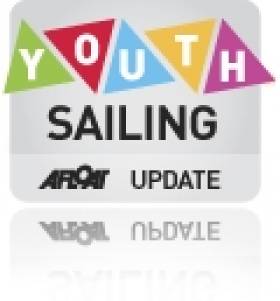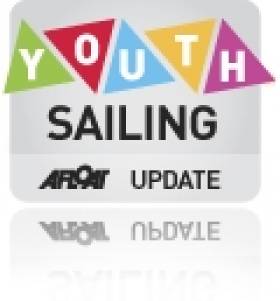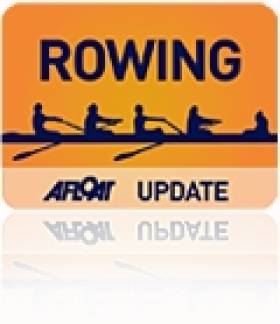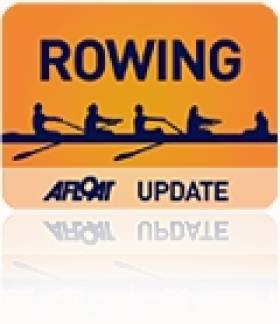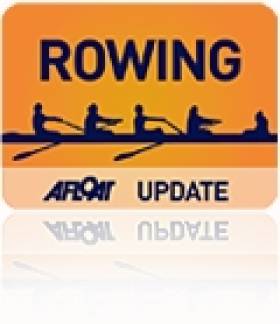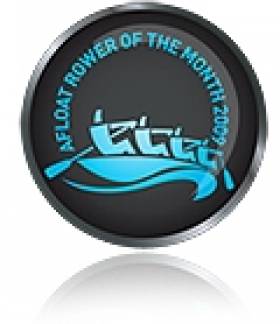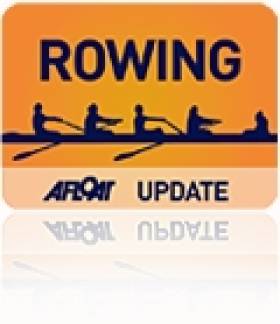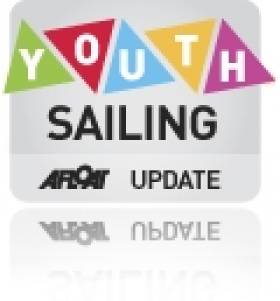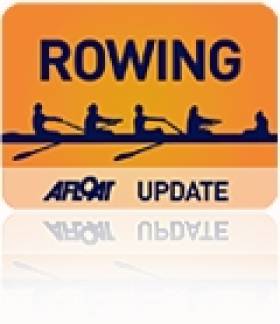Displaying items by tag: UCD
Ireland Place Fourth In Student Yachting World Cup
#sywoc – The UCD Sailing Team, led by Philip Doran, has placed fourth overall for Ireland in the annual Student Yachting Worlds which concluded on Wednesday night at La Rochelle on France's Biscay coast. In a highly pressurized and very international event which Ireland has twice won overall within the past decade, it was the third year in a row that UCD had won the right to sail as the national team as a result of victory in the selection series back in the spring.
Since then, the squad of Philip Doran (helm), Rory Lynch (tactics & mainsheet), Ben Fusco (trim), Sophie Murphy (trim) Tara Flood (pit), Cian Mollen (mast) and Will Byrne (bow), with Vinnie Varley and Hannah Levins as subs, have been in intensive training afloat and ashore as it could best be fitted into their own busy summer sailing programmes, and as well they were brought to a peak of fitness in UCD's High Performance Gym.
The event itself was raced in Grand Surprise performance keelboats, and sailing conditions covered just about all the options for an international field of 12 nations, the most-travelled being Canada, the USA and Japan. From the outset, the English team helmed by Annabel Vose was putting in a prodigious performance whatever the kind of race and course being set, and their final scoreline of 1,2,1,1,1,1,2,1, 2,5,5,3,1,1,1,2 pretty well sums up the progress of the event.
At one stage Ireland was looking good for third overall, but an OCS put paid to that, with Norway slipping into the remaining podium position by just one point.
Two IRL international judges were on the Jury for the event - Tony O'Gorman and Gordon Davies (chairman)
STUDENT YACHTING WORLDS 2014
1st England (helm Annabel Vose) 30pts; 2nd Italy (Luca Nassini) 76pts; 3rd Norway (Ida Trulsrud) 87pts; 4th Ireland (Philip Doran 88pts; 5th Switzerland (Ireneu Pla) 89pts; 6th USA (Dillon Lancaster) 93pts.
UCD Sailing Team Return To Student Yachting Worlds 2014
#sywoc – UCD will return to the Student Yachting World Championships next month to represent Ireland for the third year in row and as previous winners in 2012. UCD launches its team for the 34th Student Yachting World Cup this coming Saturday, October 4th. The event will be held in the Royal Irish Yacht Club, Dun Laoghaire at 5pm. The team and its sponsors will be announced.
The SYWoC (Student Yachting World Cup) is an event organized every year in France by students for students. The event has been taking place since 1979 and is seen as the most prestigious keelboat competition in the student sailing calendar.
This year's event is being held in La Rochelle from October 15th-22nd. The championship will be sailed using Grand Surprise 32s designed by Joubert-Nivelt. UCD Team Ireland will travel with high aspirations having won the event in 2012 at the same venue.
Fifteen teams from as far as China, Australia and the USA are expected to compete and represent their universities and nations. The sailing crew will be composed of a minimum of 6 members and a maximum of 8 members with at least 2 women and two men on board.
#ROWING: Two of the big wins of the evening session of finals at the Irish Rowing Championships at the National Rowing Centre in Cork came to crews with very different levels of experience.
The Cork Boat Club junior women’s eight made a breakthrough for the club at this level by beating Portora and Bann in a fine race. The senior men’s quadruple was taken by the crew of Albert Maher, Sean Jacob, Con Collis and Michael Maher, who held off a challenge from the Castleconnell/University of Limerick crew. Jacob and Maher are both in their forties and have over 40 ‘Pots’ between them.
The women’s senior pair was won by Barbara O’Brien and Aifric Keogh, representing NUIG, while Sarah Quinn of Belfast Boat Club won the Club singles.
The junior men’s quadruple gave Shandon’s young crew – two are junior 17 athletes and one a junior 16 – a fine win over Skibbereen, who faltered before the finish.
The women’s lightweight single sculls final turned into a battle between Claire Lambe of Old Collegians and Siobhán McCrohan of Tribesmen, with the Dubliner coming out on top.
Turlough Hughes of UCD had a remarkably straightforward win over David O’Malley of St Michael’s in the men’s intermediate single sculls, while UCD held off a late charge by Queen’s to win the men’s novice eight.
Irish Rowing Championships, National Rowing Centre, Cork (Selected Results; Finals)
Men
Eight – Intermediate: 1 Trinity 5:46.25, 2 NUIG 5:50.28, 3 UCD 5:56.96. Novice: 1 UCD 6:59.50, 2 Queen’s 7:02.31, 3 Trinity 7:03.29.
Four, coxed – Junior: 1 Cork BC 6:35.99, 2 Presentation 6:36.22, 3 Portora 6:38.08.
Pair – Senior: 1 UCD (M O’Donovan, N Kenny) 6:46.05, 2 NUIG 6:49.95, 3 Commercial B 7:00.16.
Sculling, Quadruple – Senior: 1 Old Collegians/Commercial (C Collis, S Jacob, A Maher, M Maher) 5:59.84, 2 Castleconnell/University of Limerick 6:00.60, 3 Queen’s 6:07.90.
Junior: 1 Shandon 6:08.24, 2 Athlone 6:13.34, 3 Skibbereen 6:15.52.
Single – Intermediate: 1 UCD (T Hughes) 7:13.0, 2 St Michael’s (O’Malley) 7:20.72, 3 NUIG (O’Connor) 7:25.14. Club: Lee (D O’Sullivan) 7:31.80, 2 St Michael’s (P O’Connor) 7:36.24, 3 Belfast BC (A Murray) 7:39.44.
Women
Eight – Novice: 1 Queen’s 7:19.74, 2 Trinity 7:55.75. Junior: 1 Cork BC 6:39.32, 2 Portora 6:41.90, 3 Bann 6:45.27.
Sculling, Double – Intermediate: 1 Killorglin (F Foley, M Dukarska) 7:17.17, 2 Commercial 7:20.83, 3 Skibbereen 7:39.99.
Pair – Senior: 1 NUIG (B O’Brien, A Keogh) 7:33.89, 2 St Michael’s 7:42.32, 3 Shannon 7:42.48.
Single – Lightweight: 1 Old Collegians (C Lambe) 7:41.70, 2 Tribesmen (McCrohan) 7:43.80, 3 Skibbereen (Hayes) 8:01.34. Club: 1 Belfast (S Quinn) 8:09.22, 2 Queen’s (Edwards) 8:10.61, 3 Lee (McGuire) 8:39.69.
Junior: 1 Cork BC (O Forde) 8:06.14, 2 Belfast BC (J English) 8:07.11, 3 Commercial B 7:00.16.
UCD Push NUIG/Grainne Mhaol Hard at Cork Rowing Regatta
#ROWING: Gráinne Mhaol/NUIG were pushed hard by UCD, but came away with the Division One eights title at Cork Grand League Regatta at the National Rowing Centre. NUIG came in third, despite having to do without the services of Kevin Neville, who had fallen ill during the heats. The experienced Gráinne Mhaol crew of Dave Mannion, Alan Martin, Cormac Folan and James Wall won the Division One four, while Skibbereen won the women’s four.
Andy Harrington of UCC won the Division One single sculls from Eimantas Grigalius of Three Castles and Fergus Fauvel, a New Zealander studying in Galway. Fauvel also rowed at number four for the winning eight.
Catríona Jennings of Commercial, who only took up rowing in the past two years after competing as a runner at the Olympic Games, won the Division One single sculls.
The timing system at the regatta, a bugbear at a number of Grand League events, caused some difficulties.
Keohane A Winner At Metropolitan Regatta
#ROWING: John Keohane won the men’s senior single sculls at Metropolitan Regatta on Dorney Lake on Saturday. The Lee Valley man was among a number of Irish winners on the day: Carlow and NUIG won the Intermediate One fours and coxed fours respectively and UCD’s women eight won their intermediate one final. The Gráinne Mhaol/NUIG crew were second in the senior eight.
Metropolitan Regatta, Dorney Lake (Irish interest, selected results)
Saturday
Men
Eight – Senior: 2 Gráinne Mhaol/NUIG.
Four – Intermediate One: 1 Carlow. Four Coxed – Intermediate One: 1 NUIG
Pair – Intermediate One: 3 Presentation Brothers, Cork.
Sculling, Quadruple – Intermediate One: 2 UCC. Junior: 3 Cork BC
Single – Senior: 1 Lee Valley (J Keohane) Intermediate One: 3 Carlow (Aaron Bolger)
Women
Eights – Intermediate One: 1 UCD; 3 Trinity (three-boat final) Fours, coxed – Intermediate One: 1 UCD 7:19.2. Intermediate Two: 2 Commercial.
Pair – Senior: 2 Cork BC
Sculling, Quadruple – Intermediate One: 3 UCC.
#irishsailing – After five years of economic contraction, there are signs of recovery, and the 2014 Irish sailing season has also got off to a flying start. W M Nixon looks at various signs of new energy and initiatives, and sees how they might be affecting stories which have been run on this blog and in the Afloat.ie website during the past year. But he concedes that further cost reductions will be necessary for the good of the sport.
A year ago, any talk of green shoots in Ireland was almost entirely metaphorical. And it was in the economic sphere, though even there they were still few and far between, with many soon stunted. But out in the farmers' fields themselves, out where the grass should have been growing, there was scarcely a sign of life as we were still trapped in the coldest and most miserable Spring in living memory, and all forms of growth and recovery were blighted by it.
Sailing and boating, of all sports, are the most affected by Ireland's climatic conditions. Not only is the mood among participants strongly influenced by weather which sometimes can get anyone down, but without reasonable breezes, sailing events are seriously impaired. "We got a result!" may well be the PRO's final desperate claim after pulling some sort of a points table and leaderboard out of a series bedevilled either by too much or too little wind. But it's so much better to have a series bathed in sunshine and blessed by fine breezes, with enough races sailed for the crews to go home tired but happy without needing recourse to any of those weasel words which show you're only trying to justify a weekend of frustration.
Things could not be more different this year. The Spring of 2014 has been perfection, boats are going afloat on time and in reasonable weather conditions, and the first little crop of events and results are very encouraging indeed - so encouraging, in fact, that "little crop" doesn't do them justice.
That said, two of the nearer events which gave special cause for Irish celebration did not have perfect weather throughout. The Youth Sailing Nationals at Howth may have ended on a high with a great breeze in an early taste of summer sunshine, but one day out of the four was lost to bad weather. But the sting of that was lessened by the decision for "no racing all day" being taken at 1100hrs, which allows other leisure options to kick in.
The IRC Easter Championship in the Solent concluded through Easter Monday literally with "Darkness at Noon" – the heavy clouds and torrential rain on an almost windless day saw the final races being sailed with nav lights on. But there had been excellent racing on earlier days, and a very excellent result with Anthony O'Leary's Ker 39 Antix from Cork the clear supreme champion.
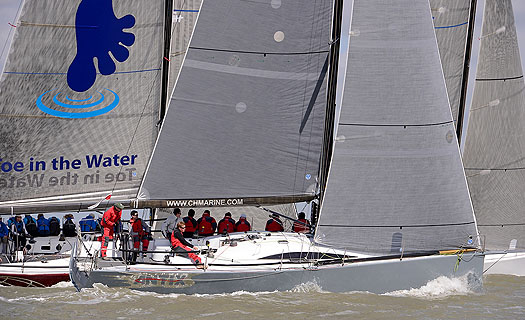
Doing the business. Anthony O'Leary's Ker 39 Antix settling into the groove on the way to the top place in the Easter IRC Championship. Photo: Rick Tomlinson
That in turn augured well for Ireland's Commodore's Cup chances, which then received a further boost last weekend when the crew of another Irish team wannabe, Quokka with Michael Boyd and Niall Dowling, had a winning weekend in the Warsash series with their temporary mount Tarka in anticipation of Quokka's return from the Caribbean at the end of May.
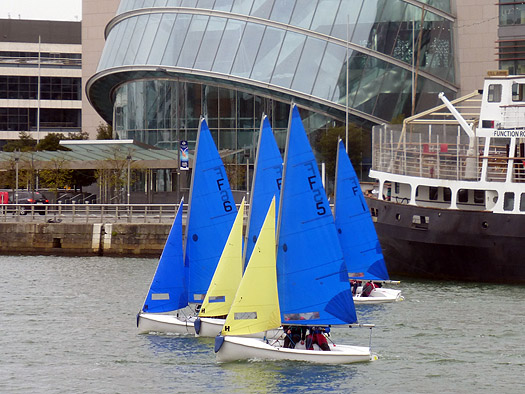
The Colours Match team racing between UCD and Trinity served up top sport in the Liffey, with Trinity winning. Photo: W M Nixon
Meanwhile the universities racing has been brought to life, for although UCD had a convincing win in the racing with the SailFleet J/80s to become the Irish team for the Student Yachting Worlds in France in the Autumn, before April was out the Colours Match in the Liffey under the burgee of the Royal Alfed YC, team-raced in Fireflies, saw Trinity take the honours in convincing style.
But if we're looking for something which really did set things freshly alight, it was out in Hyeres where the ISAF Championship saw the northern duo of Ryan Seaton & Matt McGovern take silver in the 49er, almost immediately moving them up the global rankings from 33 to 11, a quantum leap and no mistake.
The potential for serious success by these two has been fairly obvious for some time, but anyone who sails boats will know only too well how many factors have to come into alignment to get you up among the magic metals at the end of the day.
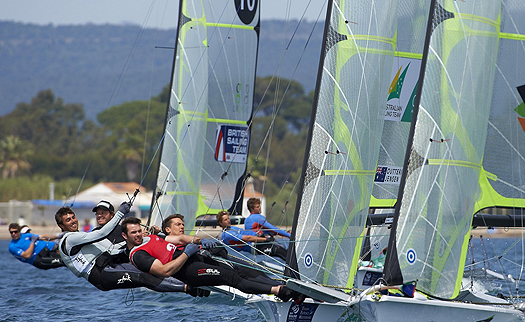
Stars of the silver sea – the Seaton/McGovern team took a silver medal for Ireland at Hyeres.
That their new global status was almost immediately acknowledged by this rankings improvement will in turn add heft to everything they do and say. Thus when, some time ago, the Ryan/Seaton equipe suggested that the 2016 Olympics sailing waters in Brazil are so off the standard as to be a health hazard, it attracted polite attention. But now that they're Number 11, and still counting down, much more notice is taken. And the fact that the Vice President of the International Olympic Committee has suggested, with something approaching despair, that the facilities in Brazil just aren't going to be ready for 2016 at any standard, all gives added legs to the statement from Ireland's 49er crew.
This in turn makes us wonder where world sailing might go in 2016 if the Brazilian setup is still Work in Progress. With tongue only slightly in cheek, we suggest they need look no further than West Cork, where Baltimore Sailing Club has been expanding its facilities to meet increased demand as a club which last year introduced something like 700 people to sailing. That BSC and current Mitsubishi Motors "Club of the Year" Kinsale YC further east along the West Cork coast have both been putting in premises up-grade during the past year, while other clubs have been having it tough, and just about hanging in there in some cases, surely gives pause for thought.
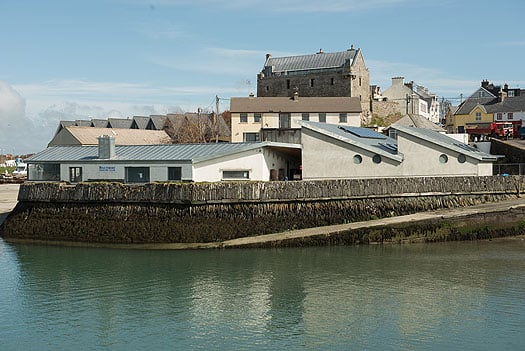
Olympic venue? The extended and up-graded Baltimore Sailing Club is ready and raring to go.
The economic shakeout of the past five years has caused a massive write-down in the value of almost all property and other assets. And in the case of yacht and sailing clubs, there has been a detailed examination of the continuing validity, or otherwise, of established yacht clubs and their traditional business model of quite high subscriptions under-writing other facilities which in turn combine to provide the complete package of an orthodox yacht club.
Inevitably, most clubs are run by officers and committee members who have been involved with the club for many years. Thus, like people who have been running a quality hotel for decades, they may have an inflated notion of what their organisation and its premises are actually worth. Admittedly there's only limited usefulness in comparing a yacht club with a hotel, but lessons can surely be learned. The fact is that hotels today are worth maybe only a third or even less of what they were reckoned to be worth six years ago. And equally, while yachts clubs certainly have a unique package to offer, is it unusual enough and special enough to charge high subscriptions when there are alternative facilities and services available?
The dilemma arises to some extent in all sailing centres. Last week we were discussing the story of the development of Howth YC. Today it is in the seemingly happy situation of having its own marina, thus it theoretically can offer an attractive all-in-one package to any potential member. But the very fact that Howth YC has done so much to help make Howth a colourful and vibrant sailing/fishing port is partly to its own disadvantage. The place has developed as a remarkable focus for top seafood restaurants. This means that the extensive club catering facilities – expected by traditional members - are constantly battling for business with a whole slew of award-winning eateries and characterful pubs nearby.
The problem is more acute in Dun Laoghaire in that the only club within the marina area is the Royal Irish YC. Thus while people may have been loyal members of the National, the Royal St George and the Dun Laoghaire Motor Yacht Club, they find that after going out in the boat, it's very easy to round out the evening aboard in the marina, chatting among themselves or with other crews on boats nearby, and then head straight for home without making their number in their home clubs at all.
This situation is less in evidence at weekends and during special events. But nevertheless it was causing such a lessening in mid-week club vitality that various steps have been taken, and the Royal St George's move to take over berths in a block booking in the outer marina, and service them by a frequent ferry direct from the clubhouse, is a visionary step.
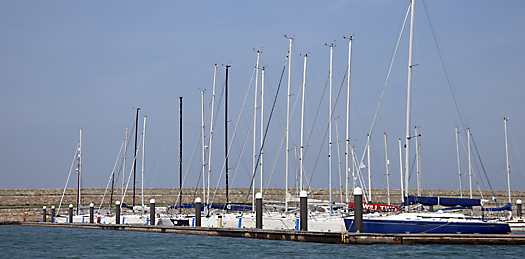
The Royal St George YC has introduced a direct ferry service from the clubhouse to its group of berths in the outer marina in Dun Laoghaire. Photo: David O'Brien
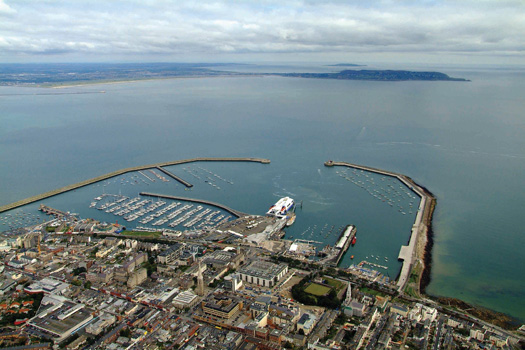
To overcome a lack of direct access to the Dun Laoghaire Marina, the Royal St George YC is running a ferry service from its clubhouse (to right of Stena Ferry, foreground) to the berths in the Outer Marina (upper left) Photo Kevin Dwyer/courtesy ICC.
Nevertheless, in all club administrations there are those who are of the opinion that, whatever the Honorary Treasurers may believe, there has to be a radical re-think of the primary subscription levels. In essence, they're suggesting that the book value of the club has to be written down such that subscriptions are halved. Personally, I haven't much of a notion of how to read a balance sheet, but the dogs in the street know that in the hospitality industry – which, in the broadest sense, is the area in which yacht and sailing clubs operate – values have been savagely slashed, and while charges may still seem high, at least the places are surviving as going concerns.
With continuing reduction in expenses across the board, one area in which there seems to be much work afoot is in the Irish Sailing Association, which in latter days had begun to seem like some hidden corner of the civil service, existing more for the benefit of staff than for the provision of services for sailors. It's amazing to learn that the ISA has sixteen fulltime staff, and a basic annual wages bill of something like €600,000. When you add in the expected benefits, it musty come in total to a very tidy yearly sum.
What on earth do they all do? While you'll invariably find the ISA logo in prominence at some top events, it has to be said that you're entirely unaware of the organisation's existence in any form at more everyday happenings, and it doesn't seem to be because they believe in doing good work by stealth. But with special study groups resulting from the major changes introduced in the ISA setup at the AGM in March, we can only hope that in time the Association will reflect the cost-cutting which has had to be introduced in the clubs, which provide the main part of the ISA's income.
While the administrative structures are rightfully being pared back in many areas of our sport, the coastal infrastructure, on which all forms of seagoing ultimately depend, continues to need maintenance and development. In this area, one very promising green shoot is the news that there are signs of movement in Dunmore East. A dredging programme is getting under way, and just this Tuesday, Minister for Marine Simon Coveney TD convened a meeting in the port to inaugurate a community approach to harbour development which, it is hoped, will help to invigorate the many places around Waterford Estuary, for which Dunmore East has the potential to be the true gateway harbour.
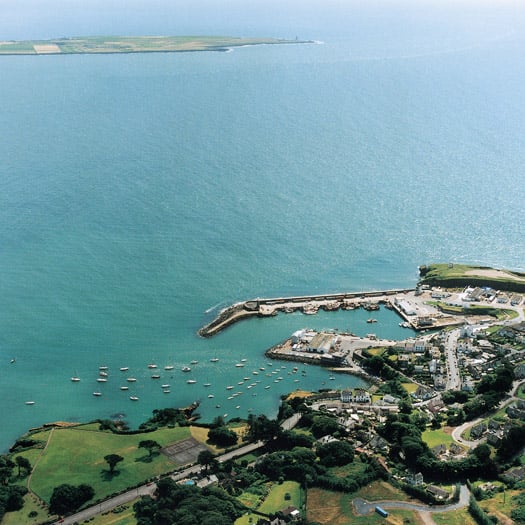
Dunmore East – can it fulfil its potential as the gateway leisure port for the Waterford Estuary? Photo Kevin Dwyer, courtesy ICC
In a more extreme marine environment, it has been confirmed that €6 million will be spent on improving the pier at Doolin in northwest Clare, the nearest mainland quay to the Aran Islands, which also caters for the tour boats cruising along the Cliffs of Moher. While the locals seem well pleased, I wouldn't get too excited about it. This is one very rugged part of the coast, and when you remember that it took €31 million to extend the pier at Kilronan in Inismor, the main Aran island, and another €14 million to build the little harbour at the north end of Inis Meain, the middle Aran island, then we can only hope that €6 million is going to achieve something more than a few boulders being shifted about in the roaring ocean at Doolin.
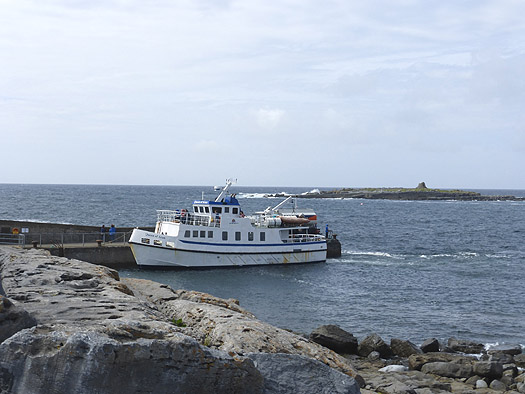
The pier at Doolin is decidedly minimalist, but it provides the shortest sea passage to the Aran Islands. Photo: W M Nixon
But then, in the west all things are possible, and along the ocean seaboard we're told that four thousand signs are being erected to guide people along the Wild Atlantic Way, the new tourism initiative using many smaller coastal roads. Quite so. Frankly, with signage at this level, it will be the Tame Atlantic Way by the time half of them are in place. I have to admit to being a complete curmudgeon in this. In many years of transitting Ireland's west coast by sea and land, one of our favourite areas while driving along the west coast has long been the coast south of Kilkee down to Loop Head, where the cliffs comfortably rival anything the vulgar Cliffs of Moher have to offer, and it is magnificently uncrowded. But not any more, if the Wild Atlantic Way movement has its way.
While I appreciate that visitor numbers have to be kept up and increased whenever and however, it has to be done in a way which appreciates that's what brings people to Ireland (rather than just to Dublin, which is a special case) is an unspoilt landscape. So, four thousand signs just for the one Atlantic Way? Ogden Nash had something to say about this:
"I think that I shall never see,
A billboard lovely as a tree.
But then, until the billboards fall,
I'll never see a tree at all".
Be that as it may, the final sign that suggests things are on the move again is a notice I spotted recently posted at a nearby club, though language pedants might wonder how a notice which manages to mangle so utterly the plural of "dinghy", even to adding a completely superfluous greengrocer's apostrophe, could be seen as encouraging in any way whatsoever.
Well, once you've overcome your opinions about the errors, the underlying message must be good news. More youngsters are evidently coming to sailing this year. And as for the spelling mistake, even that's an improvement. A year ago, the same notice board opened by referring to something called "a dingy", but this time round we have to get to the second line before finding that. And it all comes right for dinghies in the end.
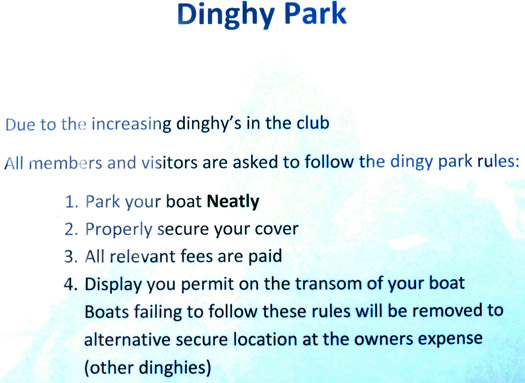
Sign of the times? Whatever about the spelling, this current notice at an Irish sailing club has an underlying message of good news. Photo: W M Nixon
Trinity Senior Eight are Afloat Rowers of the Month for April
#ROWING: The Trinity men’s senior eight are the Afloat Rowers of the Month for April. The crew won at the Irish Universities’ Championships at the National Rowing Centre in Cork, beating UCD, and they were convincing victors over NUIG/Gráinne Mhaol at the first Grand League regatta of the year, Skibbereen Regatta. Gráinne Mhaol/NUIG, in some combination, have won four of the last five national titles.
In March, Trinity had been beaten by UCD in a stirring battle in the Gannon Cup and they had also been joint winners of the Dublin Head of the River, dead-heating with a composite crew of Commercial, Gráinne Mhaol and Old Collegians.
Rower of the Month Awards: The judging panel is made up of Liam Gorman, rowing correspondent of The Irish Times and David O'Brien, Editor of Afloat magazine. Monthly awards for achievements during the year will appear on afloat.ie and the overall national award will be presented to the person or crew who, in the judges' opinion, achieved the most notable results in, or made the most significant contribution to rowing during 2014. Keep a monthly eye on progress and watch our 2014 champions’ list grow.
UCD Crew Disqualified For Breach of Grading Rule
#ROWING: A crew has been disqualified from the Skibbereen Regatta. The UCD Club Two women's eight substituted in a senior rower. When processed after the regatta, this pushed the points total of the crew well beyond the figure allowed for the grade. The UCD crew won the race, but Shandon Boat Club have been granted the win. The grading system involved is new this season, but Rowing Ireland warned those forming crews that "there will be fines imposed for future breaches of the rules".
Trinity Win Colours Team Race in River Liffey Test
#coloursmatch – The annual Colours races between UCD and Trinity underwent a revitalisation this year, with a new location, new format and all new commentary. It was run over the whole day on Saturday (12th April). The event was held in the heart of Dublin city, in front of the Convention Centre on the Liffey. Spectators watched from the quays and the MV Cill Airne, while listening to Chris Tordoff, Ireland's most talked about sailing commentator.
The Colours match was organised from a sailing point of view by the Royal Alfred Yacht Club, using material provided by the Royal St George. Poolbeg generously allowed their premoses and pontoons to be used.
A full schedule of races was completed, with all the teams bar the firsts and alumni taking part in 2 round robins, of which UCD 2 and UCD 4 won the Gold and Silver round robins respectively. The alumni races were held shortly after, and Trinity came out on top in their best of 3 race, where some of the past leaders of each club fought it out, trying to remember their skills from their college days.
The ladies race which was scheduled unfortunately did not get to be completed due to the time restrictions on lifting the East Link bridge to get the boats back out to Poolbeg Yacht and Boat Club. However, while UCD came out on top in both round robins, the title of Colours Champions goes to whichever college wins the best of 5 races between the colleges. UCD were favourites after their win at Varsities in February, however Trinity had been training hard to break UCD's winning streak over the past 4 years. With the flow in the river picking up pace, the highly contested races began with a large crowd gathered on the MV Cill Airne to watch.
Trinity had great starts, and took an early lead in the first 2 races to hold on and win both. With UCD's hopes coming down to the do or die 3rd big performance was needed. The 3rd between the sides a few times, until Trinity pulled out a very solid final beat to go on to win their first Colours match in 4 years. The winning Trinity team was Scott Flanigan, Lucy Bolger, Jack Hogan, Iain Irvine, Rich Roberts and Ally Dix.
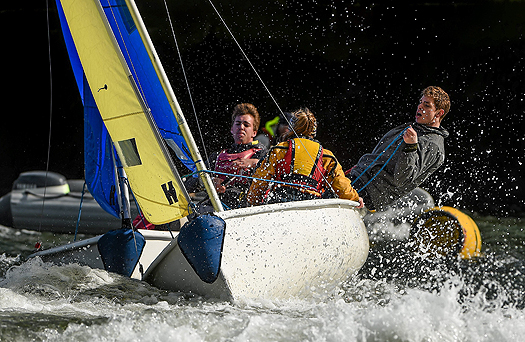
Cillian Dickson, right, and Albha McDermott, Trinity College, in action against Cian Mollen, University College Dublin, left, during their race. Photo: Pat Murphy/Sportsfile
The Colours match marks the end of the college sailing circuit for 2013/14. While there was not much sailing achieved at the 3 events before Varsities, it was still a remarkable year. UCD won one of the tightest Varsities finals in years, the Student Yachting Nationals in Howth were incredibly close between the 8 J80s, and Colours was run with unparalleled success. Colours on the Liffey should become a yearly event after its success this year.
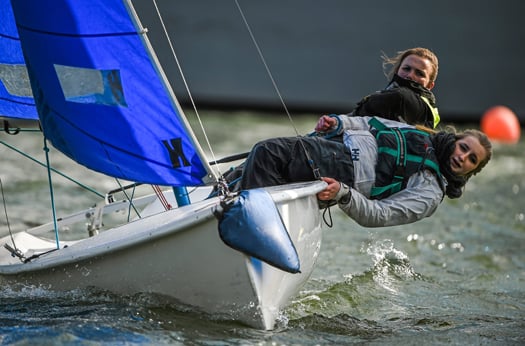
Sophie Murphy and Ali Moorhead, University College Dublin. Photo: Pat Murphy/Sportsfile
Thanks must be given to Energia and Bank of Ireland for their support in running the event, without which the event definitely would not have taken place, and to the MV Cill Airne for hosting the sailors during the day and night.
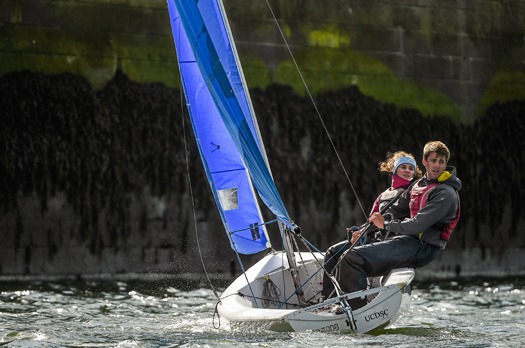
Cian Mollen and Emily Jones of University College Dublin. Photo: Pat Murphy/Sportsfile
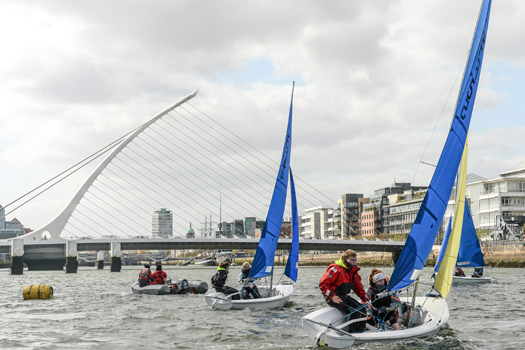
In the shadow of the Samuel Beckett bridge. A general river Liffey view of the racing action during the final race between University College Dublin and Trinity College. Photo: Pat Murphy/Sportsfile
The Winner's View...
Trinity College Sailing reports on how its 2014 sailing season finished with a bang, beating the UCD favourites to win the Colours for th first time in five years
For the first time ever, the annual colours match between arch rivals Trinity College Dublin and their noisy neighbours UCD took place on the River Liffey. UCD commodore Vinnie Varley pulled out all the stops and had the bridge lifted for all 12 boats to sail to the race area which was beside the MV Cill Airne. There was serious tension between the two colleges in the lead up to the event, with UCD snatching a win from TCD on countback in the Student Yachting Nationals the week before along with the usual undertones from the Belfield campus.
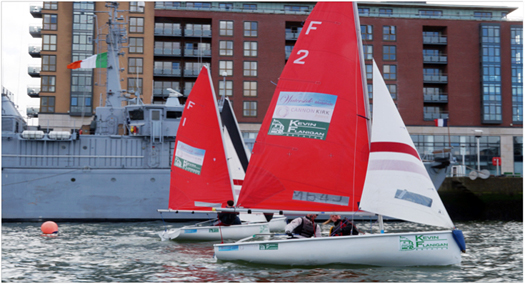
TCD Alumni, helms Jake Mealy, Luke Finnegan and Christopher O'Reilly won their best of three series, starting off Trinity's victory. Photo– Stephen Doyle/Vision Media
All sailors were faced with very challenging racing conditions aside from the shifty and gusty breeze. With one eager fresher commenting "There were obstacles such as the Liffey Barge that we were not normally used to having to deal with!". Spectators watched from the MV Cill Airne where running commentary was provided by The Viper, who's focus was more on tales of ferry journeys than on the fireflies!
The morning provided a different running order to usual, with the 2nd-5th's racing in a round robin. The Trinity faithful were spurred on following the return of the familiar face of Finn Murphy , who spurred the "Fighting fifths" on up the last beat to secure one of the most dramatic wins of the day. TCD 2 went unbeaten in the morning round robin with the young guns of TCD 4 also putting in a big performance to pave the way for an upset.
After a mid day interval for lunch, the TCD alumni went out to set down a marker for the afternoon. Winning their side of the event 2-1 added to the shift in momentum towards the much debated rebranded "Trinity College, The University of Dublin. "
The colours match, decided on the result of the race between the two first teams, has a funny history of long winning streaks. Until 2010, Trinity had won four years in a row from 2006 and since then UCD were on a roll themselves during a golden period. Trinity were fired up to prevent UCD achieving the elusive five in a row and started strongly with a 1,2 off the line in the first race of the best of five series. This was followed up by another commanding 1,2 win setting up a tantalising prospect for the Trinity fans of a whitewash against the favourites and current Intervarsity champions.
TCD Alumni, helms Jake Mealy, Luke Finnegan and Christopher O'Reilly won their best of three series, starting off Trinity's victory.
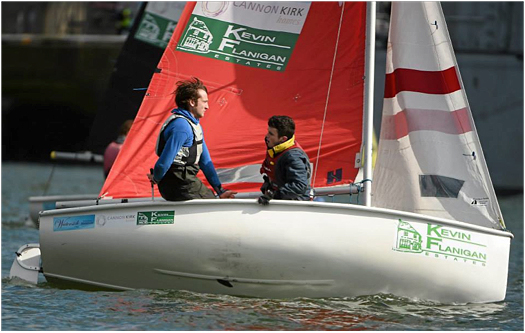
Jack Hogan and Iain Irvine (TCD 1) on the way to a comprehensive win. Photo: Pat Murphy/Sportsfile
The final race had all the supporters raised from the comfort of their seats on the Cill Airne as the drama continued right until the last beat, where Trinity converted back from a 1,4,6 into a 1,2,3 to take the Colours match by 3-0 in the best of five series. It was fantastic to hear chants of TCD across the Liffey within a few hundred metres of the iconic Front Square.
Unfortunately due to time constraints, the ladies race had to be abandoned however there were several unconfirmed sources claiming that fear had struck given the talk of Ally Dix's proposed return to the helm.
The win marks a sign of great progress for The University of Dublin as they look to rebuild towards another golden period of their own. A renewned sense of pride in our teams performances was notable.
The clubs main focus for the 2013/2014 season was on an increased racing schedule which involved three Uk trips. These were only possible due to the kind sponsorship from the TCD Alumni fund, who helped finance members from our top three teams competing in Cambridge. We would also like to thank our other main sponsors from Waterside Malahide, Cannon Kirk and Kevin Flanigan Estates who contributed greatly throughout the year towards subsiding our competition costs.
If you would be interested in sponsorsing our club or the colours event for the 2014/2015 please email [email protected] . As can be seen from the images substantial advertising space is available.
A huge thank you must go to UCD for organising such a fantastic event and also to all those who came to support from both Universities. No doubt this event will continue to go from strength to strength in it's new location.
TCD 1: Scott Flanigan/Lucy Bolger, Jack Hogan/Iain Irvine, Richard d'Esterre Roberts/Ally Dix
TCD 2: Harry O'Reilly/Kerrie O'Leary, Cillian Dickson/Alva McDermott, Jennifer Andreasson/Charlotte Murphy
TCD 3: Amy Swinglehurst/Emma Flood, Patrick Collins/Amelia O'Keefe, Annabel Elliot/Max Hickey
TCD 4: Dermott O'Flynn/Larragh Lee, Brian Carthy/Anna Hayes, Paul Martin, Florence Fanning
TCD 5: Finn Murphy/Louise O'Callaghan, James Eggers/Alison Greene, Michael Craig/Christabel Cavey
TCD Alumni: Jake Mealy/Rachael Flood, Chris O'Reilly/Alice Wyse Jackson, Luke Finnegan/Colm McLovin
Trinity Rowers Beat NUIG/Gráinne Mhaol at Skibbereen Regatta
#ROWING: Trinity beat NUIG/Gráinne Mhaol into second to win the Division One men’s eights final in warm sunshine at the Skibbereen Regatta at the NRC in Cork today. This was a surprisingly emphatic win, with over five seconds in it at the finish.
The Division One women’s final was much closer. UCD’s eight held off repeated pushes by Trinity to win by .6 of a second.
Gráinne Mhaol had earlier won the Division One men’s fours final, while a composite with international hopes – Marie O’Neill, Aifric Keogh, Emily Tormey and Barbara O’Brien were by far the best women’s four.
The Skibbereen men’s double of Gary O’Donovan and Shane O’Driscoll had a fine win in the Division One final.
Skibbereen Regatta, National Rowing Centre, Cork (Sunday Results)
Men
Eight – Division One – A Final: 1 Trinity (A McElroy, D Butler, J Magan, P Moreau, M Corcoran, M Kelly, L Hawkes, I Hurley; cox: C Sheehan; senior) 5:55.1, 2 NUIG/Gráinne Mhaol (sen) 6:00.5, 3 Carlow (inter) 6:12.7; 4 Portora (jun 18) 6:14.6. B Final: Trinity (inter) 6:09.5.
Four – Division One – A Final: 1 Gráinne Mhaol 6:20.1, 2 Commercial 6:23.9, 3 NUIG 6:30.9.
Four, coxed – Division Two – A Final: 1 UCD (club two) 7:00.3, 2 Trinity (club two) 7:03.3, 3 Trinity B (club two) 7:05.7; 4 St Michael’s (jun 18) 7:06.4. B Final: Blackrock (club two) 7:04.6; 2 Portora (jun 16) 7:08.3. C Final: Pres, Cork 7:23.7.
Sculling, Quadruple – Division Two – A Final: 1 Commercial (jun 16) 6:45.9, 2 Clonmel (jun 18) 6:52.1, 3 Lee (club two) 6:53.5. B Final: Skibbereen (jun 18) 6:59.6. C Final: Athlunkard (jun 16) 7:21.6.
Double – A Final: 1 Skibbereen (u-23) 6:38.6, 2 UCC (sen) 6:41.6, 3 Shannon (jun 18) 6:55. B Final: Shannon (sen) 6:55.4; 2 Garda (inter) 6:59.2. C Final: Garda (club one) 7:16.7.
Single – Division Two – A Final: 1 Clonmel (S Channon; jun 18) 7:41.4, 2 Belfast BC (A Murray; club two) 7:46.7, 3 Lee (D Synott; jun 18) 7:49.7; 4 Shandon (S O’Sullivan; jun 16) 7:51.1. B Final: Clonmel (S Lonergan; jun 18) 7:46.9. C Final: Carrick-on-Shannon (T McCabe; jun 16) 7:55.6.
Women
Eight – Division One – A Final: 1 UCD (C Harrison, A Crowley, S Bennett, R Larsen, O Finnegan, G Collins, A Gilligan, R Gilligan; Cox: A O’Leary; inter) 6:41.2, 2 Trinity (sen) 6:41.8, 3 Cork (sen) 6:56.0; 5 Portora (jun 18) 7:09.4. B Final: Trinity (u-23) 7:13.1.
Four – Division One – A Final: Univ of Limerick, Cork, Gráinne Mhaol, NUIG (sen) 6:59, 2 UCD (u-23) 7:16.6, 3 Skibbereen (sen) 7:24.9; 4 Skibbereen (jun) 7:28.5. B Final: Muckross (jun 18) 7:35.6.
Four, coxed – Division Two – A Final: 1 Commercial (club two) 7:50.7, 2 Garda (club two) 8:07.7, 3 Trinity A (club two) 8:37.1; 4 Muckross (jun 16) 8:37.4.
Sculling
Double – Division One: 1 Skibbereen (sen) 7:33.4, 2 UCC A (inter) 7:42.5, 3 Commercial (jun 18) 7:44.7; 5 Belfast BC (club one) 8:07.4. B Final: Killorglin (inter) 8:03.4.
Single – Division Two – A Final: 1 Belfast BC (K Turner; club two) 8:25, 2 UCC (D O’Sullivan; club two) 8:29.8, 3 Belfast BC (S Quinn; club two) 8:31.1; 4 Lee (E Cummins; jun 16) 8:39.0, 5 Muckross (Z Hyde; jun 18) 8:42.9. B Final: Lee (C Synott; jun 16) 8:38.9. C Final: Lee (S O’Mahoney; jun 16) 8:57.2.


























